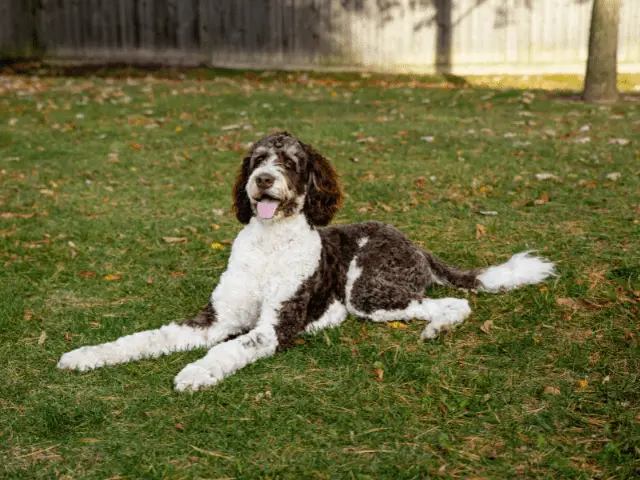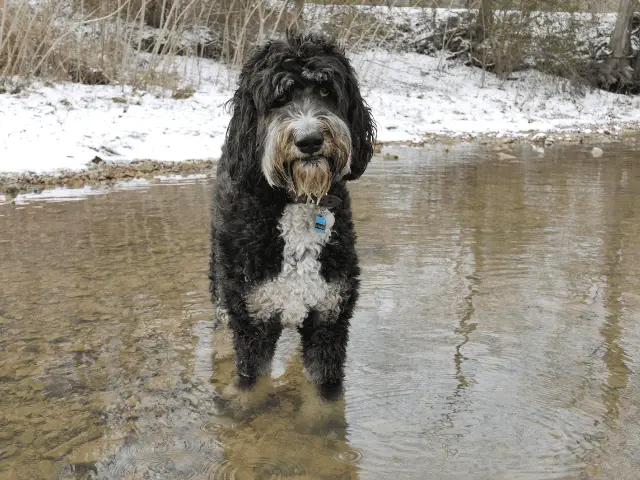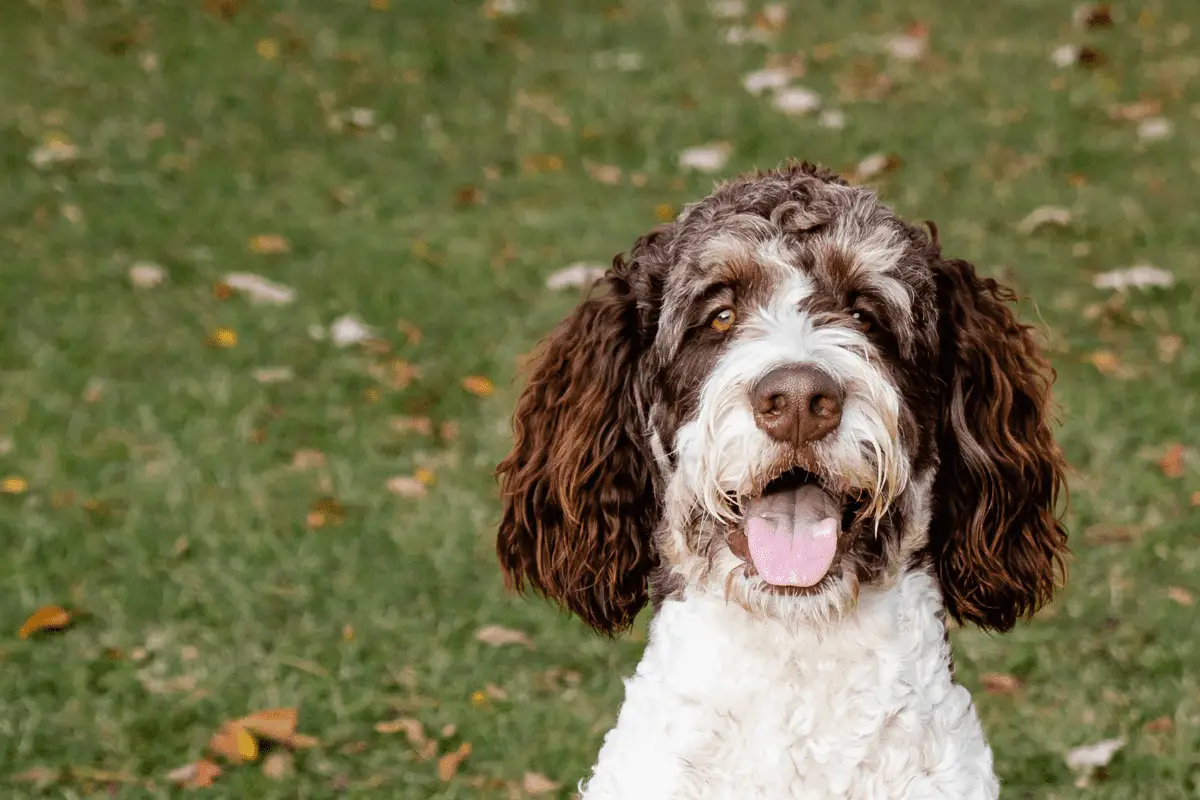Bernedoodles are one of a number of poodle mixes to appear in recent years. These “designer” dog breeds allow for the combination of a poodle’s intelligence and hypoallergenic coat with the appearance, temperament, and any other desirable traits of other dog breeds.
The bernedoodle, a cross between a poodle and a Bernese mountain dog, has been around for less than two decades, but they are relatively popular already, and they are certainly well-loved by those who know or own a bernedoodle.
But between their status as a designer dog and their somewhat unconventional combination of parent breeds, those who are less familiar with them may wonder what kind of lifestyle they are suited for. Are they couch potatoes, or outdoor adventurers, or somewhere in between?
This article contains affiliate links. If you make a purchase through one I may make a commission.
Do Bernedoodles Like Hiking?
Bernedoodles are intelligent, loyal, and energetic dogs, and much like their parent breeds, they tend to love hiking! It might be obvious from the name that Bernese mountain dogs are working dogs who love the outdoors (typically, they are used as farm dogs), but many people don’t realize that poodles are just as adventurous.
Both breeds love to accompany their owners or families on outdoor activities, especially highly physical ones like hiking.
With bernedoodles, the benefit of hiking is more than just a physical one.
Of course high-energy, athletic dogs need plenty of exercise in order to stay healthy and keep from getting antsy at home, but there is another side to the benefits: the mental side.
Intelligent breeds like poodles and poodle mixes can get bored easily if not given enough mental stimulation, so hikes are a great way for them to tire out their brains as well as their bodies.
Hiking gives them the opportunity to explore new areas, investigate new scents, and potentially even meet new people and dogs. In short, hiking is a bernedoodle’s dream come true.
How Far to Hike with A Bernedoodle

Bernese mountain dogs are a large breed, weighing between 60 and 100 pounds on average.
Poodles, on the other hand, can be “standard” (around 50 pounds), miniature (around 20 pounds), or toy (under 10 pounds). This means that a bernedoodle can be almost any size, depending on the size of their poodle parent (and, to a lesser extent, their Bernese mountain dog parent).
And although they will all love hiking, the size of the dog will determine just how far you can reasonably hike with them.
First things first: no matter what size bernedoodle you have, you should avoid hiking with them before they are one year old.
Puppies can have a ton of energy, which may make it tempting to allow them to tire themselves out with intense exercise, but hiking or running too much before they are fully grown can lead to joint problems later in life. So to keep everyone safe and healthy, bernedoodles should not start hiking with you until they’ve reached their full adult size.
A large bernedoodle, with a standard poodle parent, should easily be able to hike for up to ten miles without tiring, barring any medical issues that make the activity more difficult for them.
A medium-sized bernedoodle, with a miniature poodle parent, can probably still hike for at least five miles and possibly for longer, but they will certainly tire faster than larger doodles.
A small bernedoodle, with a toy poodle or small miniature poodle parent, may have trouble hiking more than a mile or two with you, which may make it more trouble than it’s worth to bring them out to the trail. However, if you do want to try hiking with them, they will probably have a lot of fun.
Best Weather for Hiking with A Bernedoodle

Poodles have thick, curly coats, and Bernese mountain dogs were originally bred in the snowy mountains to be working dogs, so bernedoodles are pretty well-equipped to deal with cold weather.
They don’t typically mind getting wet, and their coats are the perfect combination to keep them warm in the winter, so you should have no trouble hiking with your bernedoodle in the rain or even snow, if you yourself want to hike in colder weather.
That said, bernedoodles are not Siberian Huskies, and even they can get cold, especially if they are on the smaller side. If temperatures are extremely low, or if you notice your dog shivering or otherwise acting cold, regardless of the temperature, be sure to help them out with a warm coat to keep them safe on your winter excursions.
to keep them safe on your winter excursions.
Because bernedoodles are generally suited for cold weather, you need to be a bit more careful when it comes to hiking with them in warmer weather or in the summer. Any long-haired dog with a thick coat can overheat when exercising outdoors in warm weather, and bernedoodles are certainly susceptible to this.
The first step you can take to keep them comfortably cool in the summer is trimming their hair to an appropriate length; shaving it short in warm months will make a big difference in regulating their body temperature.
You should always make sure your dog has access to fresh water when taking them for long hikes, but it is doubly important in the summer, and you may need to take more breaks with them than usual.
Finally, keep in mind that your bernedoodle may not be able to hike as far when it’s hot out, even if their hair is short and they take lots of water breaks. Of course, you yourself may not feel like hiking quite as far in hot weather, either!
Bernedoodle Temperament When Hiking

Bernedoodles are smart, friendly dogs, and they’re popular family dogs because they are gentle and usually good with children. They’re also quite playful, and there is something silly about their mannerisms, even past the puppy stage.
In general, they aren’t noisy or “barky” dogs, so they probably won’t cause much of a ruckus when encountering wildlife on your hike.
However, because bernedoodles are so gentle, they can be a bit timid with strangers, and a stranger who does not take the proper approach in meeting them may be viewed as a threat.
Bernedoodles are fiercely loyal, the hybrid of a guard dog breed and a popular service or therapy dog breed, so they naturally want to protect you from these threats. They may bark or otherwise try to get your attention, or even guard you by showing some aggression towards unknown people and dogs.
This doesn’t mean that you can’t hike with a bernedoodle in an area where you’re likely to encounter others; they aren’t aggressive dogs by nature, so once you reassure them that the perceived threat is, in fact, a person or dog that they can be friends with, they will warm up quickly.
They’re also very fast learners, thanks to their high level of intelligence, so training and socializing them properly as puppies can eliminate the potential issue of fear or guarding before it ever starts to interfere with your hikes.
A properly socialized bernedoodle may be outgoing with everyone, even strangers, so as long as you take care of that side of training, your bernedoodle will come to view hiking as a social event, not just a fun physical activity.
Grooming Considerations
There is a range of coat textures that bernedoodles can have, but all bernedoodle coats are long and require some grooming.
Those that take after poodles, and have curlier hair, will shed very little or not shed at all, while those that take after Bernese mountain dogs, and have straight hair, will shed more.
This difference in texture won’t play a huge role in the grooming considerations you should keep in mind when hiking with your dog, but it is worth taking note of what coat type your dog has, so that you know how best to care for it.
Bernedoodle hair should be brushed regularly, especially if it is kept long. With shorter-haired bernedoodles, this will somewhat mitigate the issue of shedding, and with longer-haired bernedoodles, it will keep them from getting matted.
Maintaining the coat allows it to be as efficient as possible in keeping them warm in cold weather, so if you’re hiking with your bernedoodle in the snow, be sure to brush them frequently.
In warmer weather, you probably want to keep a bernedoodle’s hair short, to help them stay cool and especially to prevent them from overheating on hikes.
If you live in an area with more variable weather, or during times of year when the temperature is not consistent, you may consider trimming their hair short but keeping a coat readily available in case it cools down unexpectedly.
Regardless of temperature or weather, it’s important to keep your bernedoodle’s paws maintained carefully, especially when hiking with them.
Trimming the hair around the paws and paw pads will prevent snow, mud, leaves, and anything else they might encounter from getting stuck to them and making their feet uncomfortable. You may also prefer to get them shoes or boots for hiking (especially in the winter), to protect their paws completely.

